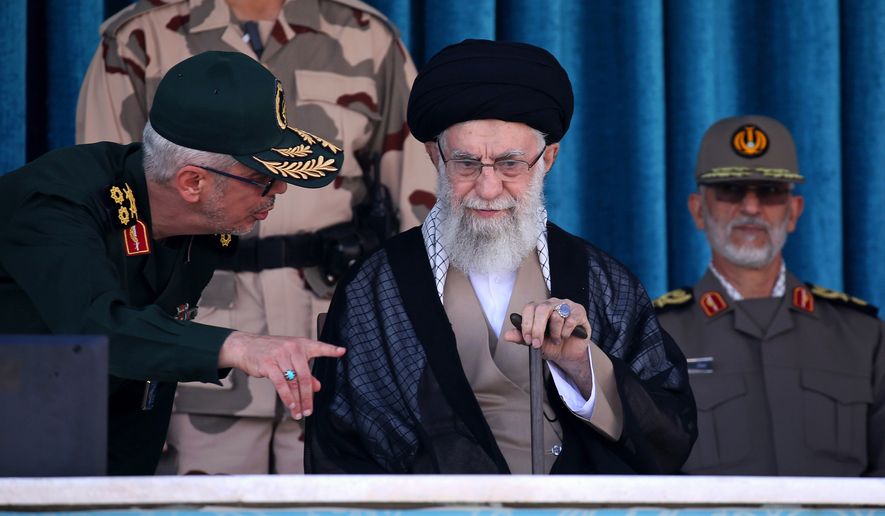Iran’s supreme leader said the U.S. and other foreign powers seeking to destabilize the country are behind weeks of mass protests that have erupted since the death in police custody of a young Kurdish Iranian woman arrested for violating the country’s strict dress code last month.
Ayatollah Ali Khamenei broke his silence Monday to condemn the “rioting” that has rocked Iran for three weeks following the death of 22-year-old Mahsa Amini. Public demonstrations are continuing to erupt despite harsh crackdowns by government forces.
The supreme leader, who is the ultimate political and military authority in Iran, said Amini’s death was a “sad incident” that must be investigated. But he focused the bulk of his remarks on what he said were the efforts of Iran’s enemies to exploit the situation.
“We were heartbroken, too,” he said Monday during a graduation ceremony for police cadets. “But the reaction to this incident, while no investigation has been done and nothing has been certain, should not have been this — that some people come and make the streets insecure [and] cause the people to feel unsafe.”
According to the official Islamic Republic News Agency, Ayatollah Khamenei pointed the finger for the demonstrations at the U.S. and Israel, which he referred to as the “Zionist regime.” He said sympathy coming from Washington over the death of Amini is “fake.”
“They are happy, in fact, for gaining a pretext to make chaos,” he said, according to IRNA.
What began as a protest against Amini’s still-unexplained death has morphed over the last three weeks into persistent street protests against economic hardship, the oppression of women and a lack of political and personal freedoms in the Islamic Republic, leading some to question whether the regime itself might be in jeopardy.
The Associated Press reported that Iranian state TV now claims at least 41 protesters and police have been killed since the demonstrations began on Sept. 17. Private rights groups and Iranian dissident organizations outside the country say the toll could be much higher.
In Washington, President Biden issued a statement saying he was “gravely concerned” about the crackdown and pledged to hold accountable those Iranian officials that are “employing violence to suppress civil society.” The U.S., he added, “will be imposing further costs” on those who perpetuate Iran’s crackdown on protestors.
“For decades, Iran’s regime has denied fundamental freedoms to its people and suppressed the aspirations of successive generations through intimidation, coercion, and violence,” Mr. Biden said. “The United States stands with Iranian women and all the citizens of Iran who are inspiring the world with their bravery.”
The Supreme Leader spoke out a day after Bagher Qalibaf, the influential speaker of the Iranian parliament, urged security forces to take a tougher line with demonstrators.
“The important point of the [past] protests was that they were reform-seeking and not aimed at overthrowing” the system, said Mr. Qalibaf. “I ask all who have any [reasons to] protest not to allow their protest to turn into destabilizing and toppling” of institutions.
The fact that the protesters’ demands have grown beyond the much-disliked headscarf mandate to broader political and economic grievances has clearly put Iran’s leadership on edge. As one sign of concern, the regime has moved to block, partly or entirely, internet connectivity inside Iran in order to make opposition organizing more difficult.
Iran’s Islamist leadership has proven determined in controlling past mass protests, including the “Green Movement” clashes following the disputed 2009 presidential election and another round of sometimes violent demonstrations against price hikes and economic difficulties in 2019.
Despite the most recent crackdown, there was unrest reported again Sunday night at the prestigious Sharif University of Technology in Tehran, where security forces joined pro-regime student groups in clashes with hundreds of students staging a fresh protest against the government
“A government that beats and attacks its own children for peacefully protesting egregious state abuses is one that has lost all connection to its people, all respect for the law, and any semblance of humanity,” said Hadi Ghaemi, executive director of the New York-based Center for Human Rights in Iran.
Ayatollah Khamenei made clear he thought the protests were not spontaneous expressions of domestic unrest. The U.S. and Israel, he charged, are working behind the scenes with “mercenaries” and traitors to Iran to foment unrest in the country.
“Do the Americans announce that they will provide the rioters with internet hardware or software to make communication easier for them?” Ayatollah Khamenei asked. “Such [claims] have been raised frequently about Iran.”
He said Iran’s official inquiry into Amini’s death is continuing and judicial authorities have vowed to “find the truth.”
— Staff writer Joseph Clark contributed to this story.
• Mike Glenn can be reached at mglenn@washingtontimes.com.




Please read our comment policy before commenting.